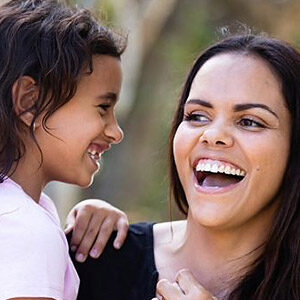Every night in South Australia, there are children and young people in need of a place to call home. Foster carers provide safe, nurturing homes for children and young people who cannot live with their birth families, whether it be for a weekend, a month or longer.
The number of First Nations (Aboriginal/Torres Strait Islander) children coming into contact with the child protection system is increasing at a much faster rate than the recruitment of First Nations foster carers. Connection to culture plays a vital role in helping children to thrive and maintain a sense of cultural identity.
Being a foster carer to these children or young people provides opportunities for you and the child to thrive. Learning how to provide a supportive environment that is culturally, socially, and emotionally safe is a unique and rewarding experience.
Let’s address some common myths about caring for First Nations children.
Myth: You cannot foster a First Nations child if you are not from the same community.
Fact: Foster care agencies endeavour to find the best match for a child or young person who needs care. When these children or young people comes into care, Department for Child Protection must explore culturally safe placements before making foster care arrangements. They will consider kinship placements, community placements and First Nations foster carer placements before the child or young person is placed with a non-First Nations foster carer.
Myth: It is too difficult for non-First Nations carers to create a culturally safe environment for an Aboriginal child or young person.
Fact: Creating a culturally safe environment for a First Nations child is an enriching experience of learning, understanding, and sharing. As a non-First Nations carer it is essential to recognise and value the importance of these children’s or young peoples connection to their family, community, culture, and country. As a carer actively supporting, maintain or re-establishing a child’s connection will promote a culturally safe environment, enabling the child to identify with, and be proud of who they are. Caring for a First Nations child or young person provides opportunities to grow, learn new skills and information so that the child can thrive. As a carer, you will be supported in ensuring that children and young people are able to connect to and celebrate their cultural values, beliefs, traditions, and identity. All carers are required to undertake cultural awareness training.
Myth: One person cannot make a difference in a child’s life.
Fact: Creating a stable and supportive environment where a child feels safe is the most important thing a foster carer can do. The role you play in supporting a child and their family through a difficult time can have a profound and lasting effect, whether they are staying with you for a weekend or longer.
Support for First Nations Children
Sometimes, these children cannot remain in their community and is placed with First Nations foster carers from another community or non-First Nations foster carers. At Centacare Foster Care, we have a dedicated Aboriginal Consultant, Brigitte Goepfert, who provides extra training and ongoing support to carers. You can speak with Brigitte about what is involved in becoming a carer and any other questions you have.
When a child comes into your care, you will receive a cultural plan. This is a comprehensive record of the child and their cultural information and cultural journey. It sets out the intentions to maintain and develop their First Nations identity and encourage connection to their community and culture.
As a foster carer, you are part of a care team. Together, we ensure that children can enjoy safe, secure homes and that carers are supported to prepare them for the challenges of fostering and reunification. Ongoing training and regular consultation are part of being a foster carer, and help is available 24 hours a day.
The Aboriginal Child Placement Principle
Centacare Foster Care acknowledges that child protection outcomes for First Nations children have historically been poor in Australia. We are committed to the Aboriginal Child Placement Principle (The Principle), which aims to keep children connected to their families, community, culture, and country.
The Principle was developed as a result of a grassroots community campaign to improve the outcomes for children by ensuring First Nations people participate in decisions about their children’s care and protection.
The Principle centres on five core elements – prevention, partnership, participation, placement and connection. It is critically important that services for First Nations children and their families are culturally safe and responsive.
First Nation foster carers needed
In order to stay true to the Aboriginal Child Placement Principle, we urgently need First Nation foster carers. First Nation foster carers play a vital role in maintaining connections to kin, culture, and country.
Furthermore, many First Nations people have first-hand experience and understanding of the impact of being placed in out-of-home care has on children, families, and community. This may include emotional anguish and loss of identity due to being separated from family, community, and culture.
If you want to know more about being a foster carer for First Nations children and live in metropolitan Adelaide, Adelaide Hills, Barossa, and Light and lower North regions, please phone our Foster Care team on 8159 1400 or email fostercareenquiries@centacare.org.au


